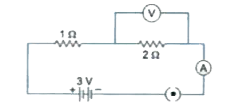Complete Solutions to SHORT ANSWER QUESTION-II of chapter ELECTRICITY of Class 10 book with complete answers and questions
| Class 10 | PHYSICS |
| Chapter | ELECTRICITY |
| VK GLOBAL PUBLICATION | SHORT ANSWER QUESTION-II |
| Number Of Questions | 8 |
| Academic Year | 2023-24 |
Why does an electric bulb become dim when an electric heater in parallel circuit is switched on? Why does dimness decrease after sometime?
View SolutionA metallic wire of resistance R is cut into ten parts of equal length. Two pieces each are joined in series and then five such combinations are joined in parallel. What will be the effective resistance of the combination?
View SolutionA wire of length L and resistance R is stretched so that its length is doubled and the area of cross-section is halved. How will its:
(a) resistance change?
(b) resistivity change?
Justify your answer in each case.
View Solution(a) The components of an electric circuit are 0.5 m long nichrome wire XY, an ammeter, a voltmeter, four cells of 1.5 V each, rheostat and a plug key. Draw a circuit diagram to study the relation between potential difference across the terminals X and Y of the wire and current flowing through it.
(b) State the law that relates potential difference across a conductor with the current flowing through it.
View SolutionDraw a circuit diagram of an electric circuit containing a cell, a key, an ammeter, a resistor of `2Omega` in series with a combination of two resistors (`4Omega` each) in parallel and a voltmeter across the parallel combination. Will the potential difference across the `2 Omega` resistor be the same as that across the parallel combination of `4Omega` resistors? Give reason.
View SolutionThree incandescent bulbs of 100 W each are connected in series in an electrical circuit. In another circuit another set of three bulbs of the same wattage are connected in parallel to the same source.
(a) Will the bulb in the two circuits glow with the same brightness? Justify your answer.
(b) Now let one bulb in both the circuits get fused. Will the rest of the bulbs continue to glow in each circuit? Give reason.
View SolutionWhat would be the reading of ammeter and voltmeter in the given circuit?

View SolutionRead the following information:
(i) Resistivity of copper is lower than that of aluminium which, in turn, is lower than that of constantan.
(ii) Six wires labelled as A, B, C, D, E, F have been designed as per the following parameters:


Answer the following questions using the above data:
(a) Which of the wires has maximum resistance and why?
(b) Which of the wires has minimum resistance and why?
(c) Arrange `R_(1), R_(3)` and `R_(5)` in ascending order of their values. Justify your answer.
View Solution
SHORT ANSWER QUESTION-II questions and complete solutions for chapter ELECTRICITY of VK GLOBAL PUBLICATION PHYSICS (HINGLISH) of Class 10